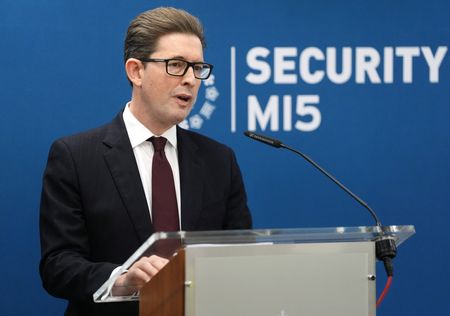By Michael Holden
LONDON (Reuters) -Britain’s MI5 spy chief said on Thursday he was frustrated by the collapse of a China spying case which has led to intense scrutiny of whether the government was to blame, saying Chinese operatives posed a daily national security threat.
Britain’s Crown Prosecution Service unexpectedly dropped charges last month against two British men, former parliamentary researcher Christopher Cash and academic Christopher Berry, who were accused of spying for Beijing between 2021 and 2023.
They had denied passing politically sensitive information to the Chinese state, while Beijing said the case was entirely fabricated.
IS CHINA A THREAT TO UK NATIONAL SECURITY?
The CPS said the case was abandoned because it needed evidence showing Britain considered China a threat to national security, but the government had not provided it after months of requests.
Opponents say that decision was because Prime Minister Keir Starmer wanted to appease Beijing. He has denied that accusation, saying his government could only describe China in the terms used by the previous Conservative government which called it an “epoch-defining challenge”.
“Of course, I am frustrated when opportunities to prosecute national security threatening activity are not followed through for whatever reason,” MI5 Director General Ken McCallum told reporters after delivering his annual speech on the threats to Britain.
“It’s frustrating when they don’t happen, but I would invite everyone to just not miss the fact that this was a strong disruption in the interests of the UK’s national security,” said McCallum, who stated MI5 had “intervened operationally” against China in the last week, without giving details.
Asked whether China posed a threat to British national security, he replied: “Do Chinese state actors present a UK national security threat? And the answer is, of course, yes, they do, every day.”
But he said Britain and China had a complex relationship and there were broader policy issues to consider.
“That one is perfectly legitimately a matter for government,” he said.
BRITAIN SEEKING CLOSER TIES WITH BEIJING
Starmer’s government has been trying to forge closer ties to China in its pursuit of economic growth, employing what it calls a “three Cs approach” – to compete, cooperate and confront – leading to accusations from opponents that it has prioritised this over national security.
Starmer, who used to be England’s top prosecutor and head of the CPS, on Wednesday sought to draw a line under the spy case controversy by publishing three witness statements from Britain’s Deputy National Security Adviser Matthew Collins, which the CPS said had failed to provide the evidence it needed.
While the documents detailed widespread Chinese malign activity, they did not unequivocally state that Britain saw China as a threat to national security.
In his second statement, Collins said China presented “the biggest state-based threat to the UK’s economic security”, but added: “It is important for me to emphasise, however, that the government is committed to pursuing a positive economic relationship with China.”
China’s London embassy dismissed the statements as being “rife with unfounded accusations”.
“China never interferes in other countries’ internal affairs and always acts in an open and above board manner,” a spokesperson said.
Opponents say Starmer has questions to answer as to why the government did not ensure the CPS had what it needed to progress the case, and whether any pressure was brought to bear on Collins.
“I feel I have to just say that I do consider him to be a man of high integrity and a professional of considerable quality,” McCallum said of Collins.
A number of parliamentary committees say they will hold investigations into what happened, and the spotlight is also on the CPS over why it decided to drop the case despite the witness statements.
“These statements were more than adequate to proceed with a prosecution in my view,” England’s former director of public prosecutions Ken Macdonald told the Financial Times.
(Reporting by Michael Holden; Additional reporting by Elizabeth Piper; Editing by Alex Richardson and Deepa Babington)













